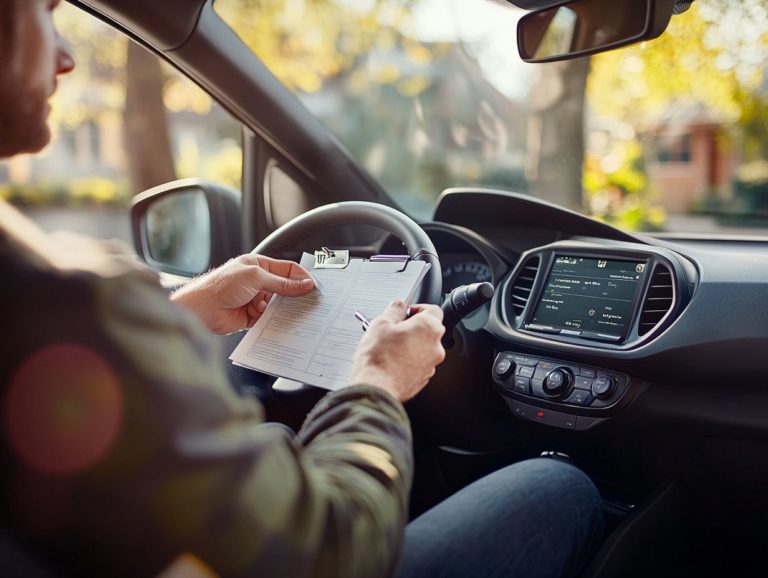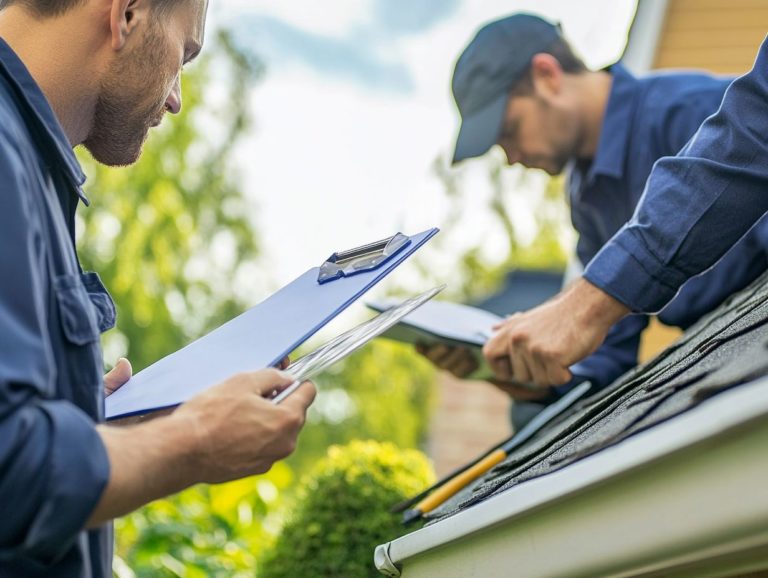Tips for Finding Honest Used Car Sellers
Buying a used car can be a smart financial move, but finding a trustworthy seller is essential to ensure you secure a reliable vehicle.
This guide will lead you through the process of researching and identifying honest sellers, leveraging online resources, and seeking out recommendations.
You’ll discover the right questions to ask to gather vital information, the key areas to inspect before making a purchase, and effective tips for negotiating a fair price.
This guide also addresses legal requirements and offers strategies to protect yourself during the transaction.
Whether you re a first-time buyer or a seasoned pro, this information will empower you to navigate the used car market with confidence.
Contents
Key Takeaways:

- Do your research and trust your instincts use online resources and referrals to find honest used car sellers.
- Ask important questions and thoroughly inspect the car before negotiating a fair price.
- Protect yourself and your investment by understanding legal requirements and taking necessary precautions during the transaction.
Why Buy a Used Car?
Buying a used car can be one of the smartest financial moves you make. It often allows you to acquire a reliable vehicle at a fraction of the cost of a new model.
The automotive market is teeming with options for second-hand vehicles. With a keen eye, you can uncover fantastic deals on pre-owned cars that fit your needs and budget.
Used cars tend to depreciate more slowly than new ones. This makes them a more economical investment over time.
With careful research and thoughtful consideration, you can confidently navigate the used car landscape.
When you choose to buy pre-owned vehicles, you often uncover substantial cost savings. Used cars typically come with fair pricing compared to their new counterparts, enabling you to stretch your budget and perhaps invest in a car that might have otherwise been out of reach.
The presence of trustworthy dealers fosters a sense of security that you ll truly appreciate.
Explore the car market for insights that match your needs. Establishing clear communication with dealers helps guarantee your satisfaction, allowing you to inquire about vehicle history, maintenance records, and warranties.
This leads to a secure and exciting purchase!
Researching and Identifying Honest Sellers
Identifying trustworthy sellers in the used car market is essential for securing a positive buying experience. This establishes a foundation of transparency in pricing and honest transactions.
By researching various dealerships on platforms such as Google, Yelp, and Facebook, you can gather invaluable reviews and insights from other consumers.
Engaging with customer queries can further illuminate the reputations of different dealerships, giving you the power to make informed choices with confidence.
Online Resources for Finding Sellers

The internet is a treasure trove of resources for finding trustworthy used car sellers. Platforms like Edmunds and TrueCar provide dealership reviews and detailed vehicle history reports, enabling you to conduct thorough online research.
This ensures that you make informed decisions when selecting a used car dealer.
Beyond these platforms, you can dive into forums and social media groups dedicated to car discussions. Here, previous customers generously share their experiences and ratings of ethical dealers.
Utilizing websites that aggregate reviews, you can easily spot trends in dealership practices, helping you identify honest dealerships committed to transparency.
Accessing vehicle history reports from services like Carfax can reveal essential insights about a car s past, including accidents and maintenance records.
Together, these resources empower you to approach your car-buying journey with confidence, facilitating a smoother transaction with reputable sellers.
Asking for Recommendations and Referrals
When you’re on the hunt for a trustworthy used car dealer, asking for referrals from friends, family, or coworkers can offer invaluable insights. These personal recommendations can guide you toward reputable sales representatives and dealerships in your area, making the buying process feel much more manageable.
These suggestions spotlight reliable options and instill confidence in your decision-making. Turning to local dealers with a solid reputation in the community provides a sense of security, as these connections often come with firsthand experiences that you can trust.
Referrals bolster trust by showcasing a dealer’s commitment to customer satisfaction. Hearing glowing feedback from someone you know significantly reduces the anxiety associated with a major purchase, leading to a smoother and more informed buying experience.
Questions to Ask When Communicating with Sellers
When engaging with sellers, it s crucial to ask the right questions to uncover vital information influencing your purchasing decision. Ask about the vehicle’s history, existing warranties, and the dealership’s policies on clear buying guidelines. This will help you make a well-informed choice.
Important Information to Gather

Collecting key information about your used car is crucial. Focus on vehicle history, warranties, and whether a mechanic inspection has been performed. Understanding these elements enhances your satisfaction and ensures the used car meets your personal preferences and standards.
When you engage with dealership staff, be sure to request a comprehensive vehicle history report. This report should detail any past accidents, service records, and title issues information crucial for making an informed decision.
Don’t hesitate to inquire about warranty options. This can provide peace of mind by covering potential repairs after your purchase.
Finding out if any pre-purchase mechanic inspections have been done can be very useful, as this might uncover underlying issues that aren t immediately visible.
Taking these steps not only safeguards your investment but also builds trust with the dealership, setting you up for a rewarding purchase experience!
Inspecting the Car and Negotiating the Price
Inspecting the car thoroughly and negotiating the price are essential steps in your buying journey that can significantly enhance your purchasing experience.
By conducting a vehicle inspection, you ensure the quality and reliability of the used cars within your budget. This practice gives you peace of mind and equips you with valuable leverage during negotiations, helping you secure a fair price.
Key Areas to Inspect
When you’re inspecting a used car, focus on key areas such as the engine, brakes, tires, and overall body condition. These components directly affect the vehicle’s reliability and longevity. Engaging a mechanic for an inspection ensures the vehicle meets proper maintenance standards, giving you confidence in your purchase.
Pay close attention to the transmission, suspension, and electrical systems. These often-overlooked areas are vital for ensuring safe driving. A trustworthy mechanic can provide invaluable insights, pinpointing potential issues before they turn into costly repairs.
Don t underestimate the role of dealership staff. They can offer detailed information about the vehicle s maintenance history and any prior repairs, aiding you in making an informed purchase decision. By understanding all these elements, you ll be well-equipped to maintain your new investment properly in the future.
Tips for Negotiating a Fair Price

Negotiating a fair price for a used car requires preparation and market insight. Effective price comparison techniques are also key. Engage in open dialogue, ask relevant questions, and reference pricing practices of ethical dealers to secure better deals.
To start, research the vehicle’s market value. Consult online resources and local listings to understand what similar models are selling for. This knowledge boosts your confidence and helps you present a compelling case during negotiations.
When communicating with sellers, maintain a friendly yet assertive demeanor. Highlight the car’s positive aspects while addressing any concerns directly. This approach builds trust. Informing sellers about reputable dealerships can help create a transparent negotiation process.
Ensuring a Safe and Legal Transaction
Ensuring a safe and legal transaction when buying a used car is essential. Familiarizing yourself with legal requirements helps protect your investment and uphold consumer protection. Confirm that the dealership possesses a valid car dealer bond to reduce the risk of fraud.
Understanding Legal Requirements
Understanding the legal requirements for purchasing a used car is crucial. Familiarize yourself with essential paperwork like the purchase agreement and vehicle title to streamline your experience with a used car dealer.
Pay attention to additional documents, such as the bill of sale, which serves as proof of the transaction, along with any warranty agreements. Although these complexities may feel overwhelming, dealership staff are there to assist you.
They can provide insights about regulations regarding emissions, safety inspections, and financing options. Engaging with knowledgeable staff ensures you meet all legal obligations and feel confident in your purchase.
Tips for Protecting Yourself and Your Investment
Protecting yourself and your investment involves several strategic moves. Start by obtaining a comprehensive vehicle history report and seek ethical dealers who prioritize customer trust. These steps help you avoid potential pitfalls.
In addition to securing the vehicle history report, verify the credentials of the dealership or private seller. Look for online reviews that reflect previous customer experiences. Don t hesitate to request references or consult local consumer protection agencies for valuable insights.
Consider scheduling an independent mechanic’s inspection before finalizing any deal. This proactive step can reveal hidden issues not shown in the initial report. By following these practices, you can navigate the complexities of used vehicle purchases with confidence.
Frequently Asked Questions
What are some tips for finding honest used car sellers?
1. Do your research. Before you start looking for a used car seller, thoroughly research online. Check reviews and ratings from past customers to gauge their reputation.
2. Ask around. Chat with friends, family, and coworkers who have bought used cars recently. They might recommend honest sellers or warn you about dishonest ones.
3. Check the history. Always request the vehicle’s history report. This report reveals any accidents, repairs, or changes in ownership.
4. Visit multiple sellers. Don t settle for the first seller you find. Check out several sellers to compare prices and customer service. This way, you ll know what to expect and be better prepared to make a decision.
5. Trust your instincts. If something feels off or seems too good to be true, pay attention to that feeling. Don t ignore red flags as they could lead you to a more honest seller.
6. Get a professional inspection. Before buying, consider having the car inspected by a professional. This can uncover potential issues and strengthen your position in negotiations.






